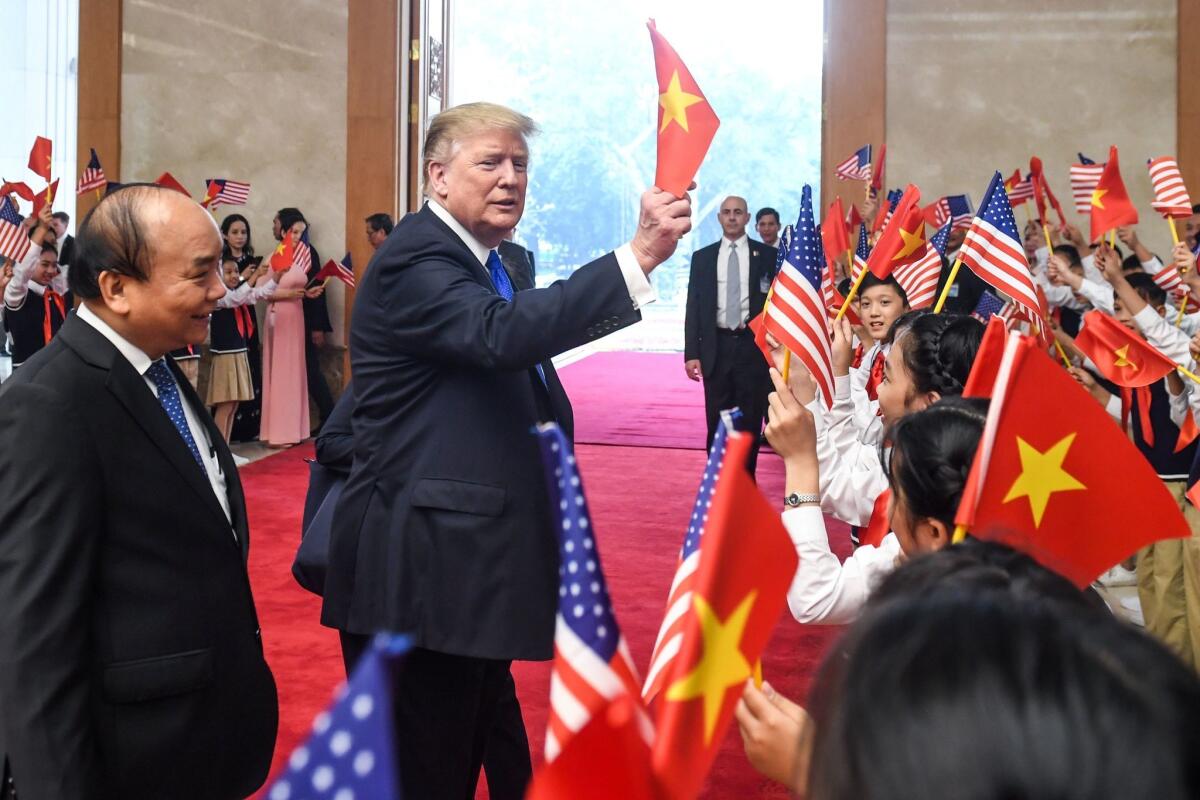Trump and Kim left their summit empty-handed, but there was one clear winner: Vietnam

- Share via
Reporting from Hanoi — Vietnam had less than three weeks to prepare to host a major summit, one involving two of the world’s most unpredictable heads of state, thousands of foreign journalists, road closures in the heart of a pell-mell capital and millions of dollars in costs.
Even though President Trump’s second meeting with Kim Jong Un ended without an agreement on curbing North Korea’s nuclear program or even a handshake for the cameras, the consensus in Hanoi was clear.
It was totally worth it.
“The summit broke down, but there was at least one big winner, which is Vietnam,” said Alexander Vuving, an associate professor at the Asia-Pacific Center for Security Studies in Honolulu.
“It provided a great opportunity for the Hanoi government to put forth Vietnam as a country, to advertise its beauty and hospitality, and to validate their economic reform model and foreign policy direction,” Vuving said.
For a one-party, Communist-led republic less than half a century removed from a bitter war with the U.S., hosting the summit placed Vietnam back in the global spotlight — this time as an emerging, capitalist-oriented economy and member in good standing of the community of nations.
Its charmingly preserved colonial heritage provided an elegant backdrop to the high-stakes diplomacy. Hanoi’s most famous hotel, the whitewashed Metropole, with its Parisian-style boutiques and polished hardwood, was the venue where Trump and Kim met, dined and posed for photos — but ultimately walked away from each other.
And its modernizing economy, epitomized by the gleaming new five-star hotels that housed the Trump and Kim delegations, was held up by the U.S. as a model for what North Korea could become if it abandoned its nuclear program and ended its international isolation.
“We both felt very good about having this very important summit in Vietnam because you really are an example of what can happen with good thinking,” Trump told Vietnamese leaders before he sat down with Kim on Wednesday.
Whereas Singapore, which hosted the first Trump-Kim summit last June, is a rigidly controlled island state known for ruthless efficiency, Vietnam’s authoritarian tendencies are challenged by its hectic urban life. In Hanoi, a city of 8 million, cars and scooters swerve around pedestrians while cafe patrons spill onto sidewalks, slurping noodles or sipping beer from low plastic stools.
Yet the summit went off with few logistical headaches and mostly unobtrusive security measures.
Green-clad police officers politely guarded the metal barricades on the street leading to Kim’s hotel. Vietnamese posed for selfies with armored personnel carriers parked outside the infamous Hoa Lo prison, dubbed the “Hanoi Hilton,” where John McCain was tortured as a prisoner of war.
“Within a short time, we have organized the summit with absolute security and safety, and welcomed leaders of the two countries and international reporters warmly,” Mai Tien Dung, a senior government official, said Friday.
Diplomats in Hanoi estimated that Vietnam spent more than $10 million to host the summit, and probably picked up the tab for housing Kim’s delegation at the five-star Melia hotel.
But officials were not sweating the bill. Dung told reporters that “while the total costs are yet to be compiled, I believe it was not much.”
Experts said the summit would bolster Vietnam’s stature as it prepares to hold the rotating chair of the Assn. of Southeast Asian Nations in 2020 and bids for a nonpermanent seat on the United Nations Security Council.
When Vietnam has hosted other high-profile diplomatic meetings, such as the World Economic Forum last year, discussions of human rights have sometimes become awkward. Vietnam has no opposition political parties, dissidents are routinely jailed, and a 2017 State Department human rights report cited torture, arbitrary arrests and restrictions on speech as persistent problems.
Unlike President Obama, who prodded Vietnam to expand democratic freedoms when he visited Hanoi in 2016, Trump made no mention of human rights. His primary announcement in meeting Vietnamese leaders was the sale of dozens of U.S.-made jets that he said would reduce Vietnam’s trade surplus, one of the main sources of tension in an otherwise blossoming relationship.
“The Vietnamese government is happy with the new approach by the Trump administration, which downplays a little bit the human rights issues and the democracy issue,” Vuving said.
Still, it was slightly discordant to see Trump waving the red communist flag of Vietnam in a photo op with schoolchildren on Wednesday, and to see his likeness printed on T-shirts for sale in Hanoi’s old quarter alongside those of Vladimir Lenin and the revolutionary Ho Chi Minh.
Such images were a sign that “the Vietnam and U.S. relationship has been fully normalized,” said Huong Le Thu, a senior analyst at the Australian Strategic Policy Institute.
“There’s no longer an awkwardness of the meeting of two different systems. It’s now a trusted place for negotiations with a third party.”
The summit presented other striking ironies, too. Vietnam has no independent domestic press, but it welcomed reporters from some 40 countries. It boasts a socialist ethos, but small businesses sought to capitalize on the summit by hawking Trump-Kim T-shirts, paintings, haircuts modeled on the distinctive dos of the two leaders — even a specialty beer at one bar that was dubbed Kim Jong Ale.
“Vietnam is open for anything,” said Nguyen Thanh Ha, a 40-year-old employee in the nonprofit sector, sipping a beer at an outdoor cafe hours after the summit broke down.
“We hoped Hanoi would become famous and have its name on a peace agreement. But we showed the world that this is a safe and friendly country.”
More to Read
Sign up for Essential California
The most important California stories and recommendations in your inbox every morning.
You may occasionally receive promotional content from the Los Angeles Times.











